Related Research Articles

The First Chechen War, also referred to as the First Russo-Chechen War, was a struggle for independence waged by the Chechen Republic of Ichkeria against the Russian Federation from 11 December 1994 to 31 August 1996. This conflict was preceded by the battle of Grozny in November 1994, during which Russia covertly sought to overthrow the new Chechen government. Following the intense Battle of Grozny in 1994–1995, which concluded with a victory for the Russian federal forces, Russia's subsequent efforts to establish control over the remaining lowlands and mountainous regions of Chechnya were met with fierce resistance and frequent surprise raids by Chechen guerrillas. The recapture of Grozny in 1996 played a part in the Khasavyurt Accord (ceasefire), and the signing of the 1997 Russia–Chechnya Peace Treaty.
The Chechens, historically also known as Kisti and Durdzuks, are a Northeast Caucasian ethnic group of the Nakh peoples native to the North Caucasus. They are the largest ethnic group in the region and refer to themselves as Nokhchiy. The vast majority of Chechens are Muslims and live in Chechnya, an autonomous republic within the Russian Federation.

Ramzan Akhmatovich Kadyrov is a Russian politician and current Head of the Chechen Republic. He was formerly affiliated with the Chechen independence movement, through his father who was the separatist-appointed mufti of Chechnya. He is a colonel general in the Russian military.

Russia has consistently been criticized by international organizations and independent domestic media outlets for human rights violations. Some of the most commonly cited violations include deaths in custody, the systemic and widespread use of torture by security forces and prison guards, the existence of hazing rituals within the Russian Army—referred to as dedovshchina —as well as prevalent breaches of children's rights, instances of violence and prejudice against ethnic minorities, and the targeted killings of journalists.
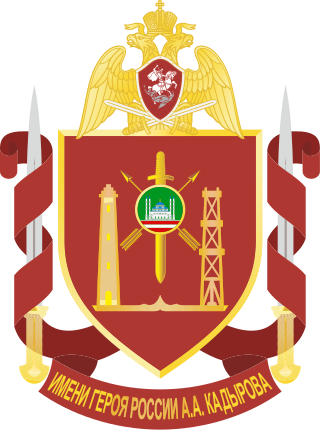
The 141st Special Motorized Regiment, colloquially known as the Kadyrovites or the Akhmat special forces unit, is a paramilitary organization in Chechnya, Russia, that serves as the protection of the Head of the Chechen Republic. The term Kadyrovtsy is commonly used in Chechnya to refer to any armed, ethnically-Chechen men under the control of Head of the Chechen Republic Ramzan Kadyrov, although nominally they are under the umbrella of the National Guard of Russia. As of 2023, the regiment's official commander was Adam Delimkhanov, a close ally of Kadyrov.
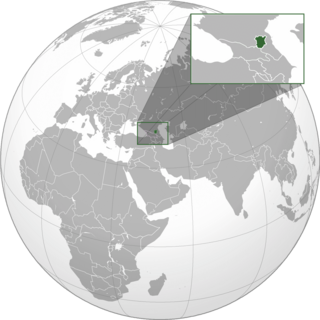
The rights of lesbian, gay, bisexual and transgender people in Chechnya have long been a cause of concern for human rights organizations such as Amnesty International and Human Rights Watch. As a member of the Russian Federation, Russia's LGBT laws formally apply. De facto, there are no protections for LGBT citizens, and the Chechen authorities allegedly encourage the killing of people suspected of homosexuality by their families.

The Battle of the Valerik River on 11 July 1840 was fought as part of the Russian conquest of the Caucasus. It occurred about 30 km southwest of the fortress of Groznaya between forces of the Imperial Russian Army and North Caucasian mountaineers led by the naib (viceroy) Ahberdila Muhammad. It remains famous because of the poem "Valerik" by Mikhail Lermontov, a participant.

The Chechen–Russian conflict was the centuries-long ethnic and political conflict, often armed, between the Russian, Soviet and Imperial Russian governments and various Chechen forces. The recent phase of the conflict started after the dissolution of the Soviet Union in 1991 and ended with the oppression of Chechen separatist leaders and crushing of the separatist movement in the republic proper in 2017.

The Crew Against Torture is a Russian non-governmental organisation in the field of human rights based in Nizhny Novgorod, Russia. CAT provides assistance to victims of torture and conducts independent investigation of torture cases. In addition, CAT publishes reports on systemic problems regarding the ineffectiveness of official investigations and prosecution of torture in Russia.
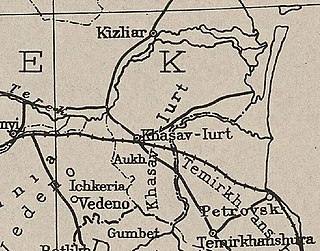
Aukh is a historical region in the current republic of Dagestan, populated by Chechens. Aukh encompasses parts of the Novolak, Khasavyurtovsky, Babayurtovsky and Kazbekovsky districts. The Chechens of Dagestan call themselves Aukhs (ӏовхой), and speak the Aukh dialect of the Chechen language.
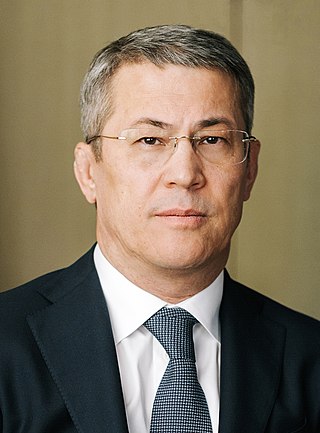
Radiy Faritovich Khabirov is a Russian politician and statesman. He is the current Head of the Republic of Bashkortostan since 11 October 2018; he is also the Candidate of Law, Honored Lawyer of the Republic of Bashkortostan. He is a member of United Russia.

Maria Kalesnikava is a Belarusian professional flutist and political activist. In 2020, she headed Viktar Babaryka's electoral campaign during the presidential elections of 2020 in Belarus. Kalesnikava represented the united campaign of Sviatlana Tsikhanouskaya, then she became a member of the presidium of the Coordination Council formed during the 2020 Belarusian protests in opposition to the regime of Alexander Lukashenko. She is also a founder of the 'Razam' political party.
According to numerous publications citing witnesses and victims of the suppression of the 2020 Belarusian protests, the events were accompanied by extreme police violence and systematic violations of human rights on all stages of a detention process, including the widespread employment of excessive force and torture, medical assistance denial and rape.

Sergey Yevgenyevich Tsivilyov is a Russian statesman, politician, economist and former military officer who is currently serving as the Minister of Energy of Russia since 14 May 2024.

Protests in Russia began on 23 January 2021 in support of the opposition leader Alexei Navalny after he was immediately detained upon returning to Russia after being sent to Germany for treatment following his poisoning the previous year. Days before protests began, a film by Navalny and his Anti-Corruption Foundation (FBK) called Putin's Palace, which revolves around the connection between president Vladimir Putin and a palace allegedly being built for him, was released.

Ivan Yurievich Zhdanov is a Russian politician and lawyer. He was the director of the Anti-Corruption Foundation (FBK) and is a member of the Central Council of the Russia of the Future political party.

Putler, sometimes extended to Vladolf Putler, is a derogatory neologism and portmanteau formed by merging the names of Vladimir Putin and Adolf Hitler. Often used in the slogan "Putler Kaput!" by people opposed to Putin, the term has a negative connotation.

The 2021 Russian election protests, also known as the "For Fair Elections" protests, began in September 2021 due to alleged large-scale electoral fraud of the 2021 Russian legislative election.
With the beginning of mobilization in Russia, anti-war and anti-mobilization protests broke out in Chechnya, Dagestan and other regions of the Russian Caucasus.
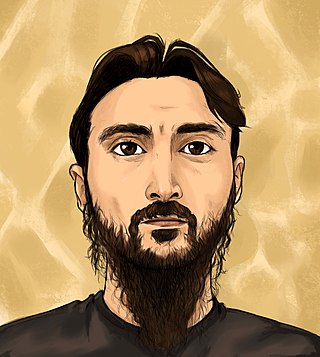
Tumso Umaltovich Abdurakhmanov is a Chechen blogger and dissident from Chechnya. He has advocated for the independence of Chechnya on YouTube and opposes the pro-Kremlin Head of the Chechen Republic, Ramzan Kadyrov. Throughout his ascent to prominence, Abdurakhmanov has been a target of several personal assaults, including assassination attempts, both in Russia and abroad. This led to him choosing to remain in Sweden in the autumn of 2019, and eventually to ask for political asylum there. Tumso has been granted Swedish asylum in October 2021. By that time, he became the most popular Chechen YouTuber.
References
- 1 2 Ритуал вины и позора. Почему в России процветает культура извинений на камеру. BBC
- ↑ Мы дико извиняемся. Фигуранты «дела 23 января» просят прощения перед камерой. MediaZona
- ↑ "How public 'apologies' are used against domestic abuse victims in Chechnya". the Guardian. 2021-07-15. Retrieved 2022-02-05.
- ↑ Рамзан, извини: кто и за что просил прощения перед Кадыровым в 2019 году. Polit.ru